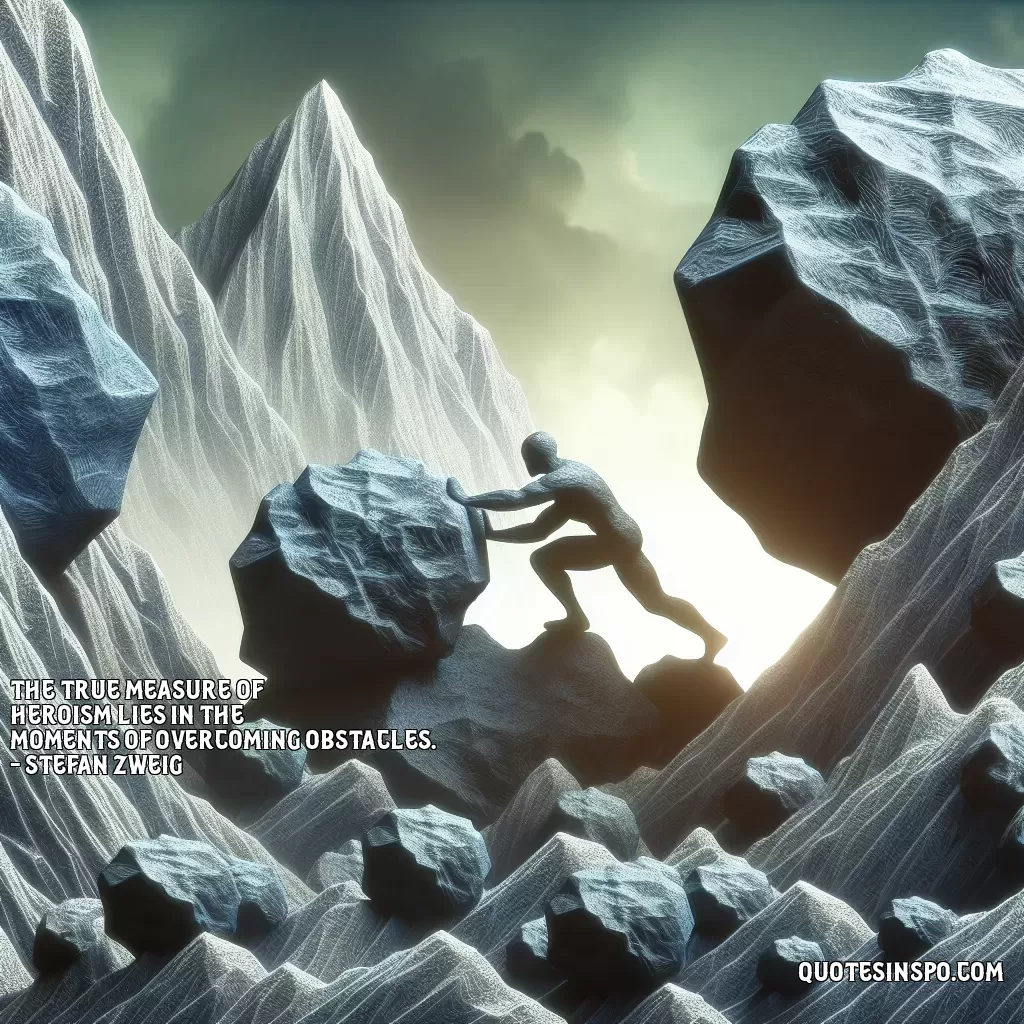
The true measure of heroism lies in the moments of overcoming obstacles. - Stefan Zweig

The true measure of heroism lies in the moments of overcoming obstacles. - Stefan Zweig
Stefan Zweig's quote, "The true measure of heroism lies in the moments of overcoming obstacles," offers profound insight into the nature of heroism. Traditionally, heroism is often associated with grand acts of bravery, such as rescuing someone from danger or defeating a formidable enemy. However, Zweig encourages us to redefine heroism by looking at the struggles and adversities individuals face and the ways they choose to confront and overcome them. The essence of this quote suggests that heroism is not solely about the accolades or the recognition that one receives for their actions. Instead, it is about the quiet, sometimes unseen, battle against significant challenges. These obstacles can be external, such as societal pressures or natural disasters, or they can be internal, such as self-doubt or fear. What makes overcoming these challenges heroic is the courage, persistence, and determination required to confront them. Moreover, by emphasizing "moments" of overcoming obstacles, Zweig highlights that heroism can often be found in brief, singular instances rather than prolonged campaigns. It is about the decision to act in the face of adversity, regardless of the outcome. This view democratizes heroism, suggesting that anyone can be a hero if they have the courage to face their personal trials head-on, regardless of whether those efforts are publicly recognized. In essence, Zweig's quote reminds us that heroism is accessible to all and is defined more by our responses to life’s challenges than by grandiose achievements. It calls for an appreciation of the resilience and strength demonstrated in overcoming obstacles, big or small, and acknowledges the heroism that resides in our everyday lives.
Quote By: Stefan Zweig
Stefan Zweig, an influential Austrian writer, was born on November 28, 1881, in Vienna, a vibrant cultural hub of the Austro-Hungarian Empire. Coming from a prosperous Jewish family, Zweig was exposed to literature and the arts from an early age, which fostered his passion for writing. After studying philosophy and literature at the University of Vienna, he began his literary career in the early 1900s, swiftly gaining recognition for his short stories, plays, and biographical studies.
Zweig's works often explore themes of human psychology, love, and the complexities of social relationships, reflecting his deep understanding of the human condition. One of his most famous works, "The World of Yesterday," serves as a poignant memoir that encapsulates the cultural and intellectual life of Europe before World War I. In this autobiographical narrative, Zweig masterfully paints a picture of a lost world, filled with artistic and intellectual vibrancy, highlighting the profound impact of the war on European society. His vivid prose and insightful observations have cemented his reputation as a literary giant.
Throughout the 1920s and 1930s, Stefan Zweig continued to flourish as a writer, producing prolific works that included novellas like "Letter from an Unknown Woman" and his notable biography of Marie Antoinette. His ability to weave narrative depth with historical fact set his biographies apart and garnered him a wide readership across Europe. However, with the rise of fascism and the annexation of Austria by Nazi Germany, Zweig's life dramatically changed. As a Jewish intellectual, he faced persecution and chose to flee Europe, a decision that led him to live in exile in Brazil.
Stefan Zweig's later years were marked by despair over the state of Europe and the loss of his homeland. In 1942, feeling overwhelmed by the devastation of war and the rise of totalitarianism, Zweig tragically took his own life in Petrópolis, Brazil. Despite his untimely death, Stefan Zweig's literary legacy endures, and he remains an essential figure in 20th-century literature, celebrated for his profound psychological insight and his unwavering humanism. His works continue to resonate, reminding readers of the fragility of civilization and the enduring power of the human spirit.